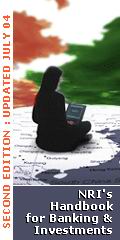|


|
Retail lending in India increases by over 30 per cent
Though the Indian financial sector does not have a sub-prime market, retail lending has increased by over 30 per cent year on year between March 2006 and March 2007 underscoring need for a caution, an ASSOCHAM Eco Pulse (AEP) Study has revealed.
As per the AEP Study on `Retail Lending’, ICICI Bank’s retail advances increased by 39 per cent at March 31, 2007, which constituted 65 per cent of advances. Centurion Bank of Punjab has focused on the growth of retail business, thus, its retail loans account for 68 per cent of net advances. Punjab National Bank’s retail credit constitutes 22.7 per cent of its net credit. Retail loans of State Bank of India, one of the largest Banks in India constitutes 21.50 per cent of its total loan book.
“In the backdrop of increased focus on retail strategy and volatility of the financial markets, the Indian banks need to be more cautious while making disbursements in the retail sector. They would do well to closely monitor their personal loan portfolios,” ASSOCHAM President, Mr. Venugopal Dhoot said without sounding “alarmist “.
Rising competition has seen over leveraging of customers, which along with rising rates may cause a rise in delinquencies. Even though this market is nascent, it’s one of the fastest-growing loan segments.
Unlike in the US, there is no sub-prime market in India. The US sub-prime market consisted primarily of people with little or no credit worthiness, most of them charged to sub-prime borrowers being mortgage loans. In India, the lower end of the personal loan market may be considered as a segment carrying some of the risks attached to the sub-prime.
Most customers in India are first-time borrowers from the organized market, and hence, have no credit history. The AEP study found that the big personal loans with an average size of around Rs 90,000 are given to more established individuals at lower rates of 14-28% against the 30-55% level.
Competition in the personal loans market has increased with the entry of multinationals, private banks and NBFCs. Citi Financial and GE Money are the oldest players in this market. However, in recent times, companies like ABN Amro, Centurion Bank of Punjab, HDFC Bank, HSBC, ICICI Bank, DBS Cholamandalam, Fullerton India and Religare have been increasingly focusing on the personal loan. In most cases, the sub-prime market for these players constitutes somewhere between 5-20 per cent of the monthly disbursements.
Though some players like Citi Financial and Fullerton go through a personal screening of customers, this is not a practice being followed by everyone. Therefore, even though, India is not exposed to sub-prime lending, the likely recession in the US market may affect entire world economy. Indian stock market is showing a downward trend in line with the global markets as the prices of Indian shares, corporate bonds and real estate are decreasing.
Most of the commercial banks have focused on retail lending by registering an increase of about 32 per cent with a subsequent reduction of 13.75 per cent in their NPAs on a y-o-y basis during the financial year 2006-07.
It further revealed that among the major commercial banks, Centurion Bank of Punjab (CBOP) topped the list in extending loans in the retail segment. CBOP saw a huge growth of 65 per cent in their retail business in FY 2006-07. Others in the pack doing well in this area of lucrative retail banking included ICICI Bank (38.5 per cent), Bank of India (35 per cent), Dena Bank (33 per cent), Allahabad Bank (29.3 per cent) and HDFC Bank (22.9 per cent).
Though the Indian banks have significantly reduced their NPAs, the sub-prime mortgage crisis in the US might still be a cause for concern in India as well, the study said.
>>> GO TO PAGE 2
CLICK FOR MORE FEATURES & STORIES
|
|



|